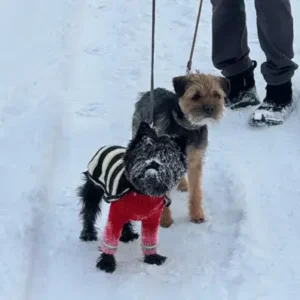Cockapoo History/Origin
The Cockapoo, a popular hybrid dog since the 1960s, originated from an accidental breeding that resulted in intelligent, low-shedding, and almost odorless puppies with the Poodle’s coat and the Cocker Spaniel easygoing and loving nature.
Cocker Spaniel- Source: AKC.org
Poodle- Source: Britannica
These attributes made Cockapoos well-received, leading to their continued popularity. Efforts are now being made to establish breed standards to achieve consistent traits in Cockapoo offspring.
Unlike many designer dog breeds, Cockapoos aren’t often surrendered, a testament to their intelligence and sweet disposition.
As the Cockapoo’s popularity grew, breeders had differing philosophies. Some aim to make the Cockapoo a purebred through multigenerational breeding, while others prefer the basic parent breeds, the Poodle/Cocker cross. The Cockapoo Club of America formed in 1999, promotes the breeding of multigenerational Cockapoos to maintain desired qualities.
In contrast, the American Cockapoo Club, established in 2004, does not mix generations or breed Cockapoos back to Poodles or Cocker Spaniels. They aim to trace Cockapoos back to their AKC/CKC origins. The North American Cockapoo Registry, founded in 1999, certifies Cockapoos from first- to sixth-generation breedings and insists on purebred Cocker Spaniels and Poodles for true Cockapoos.
Despite differing breeding philosophies, the Cockapoo’s popularity continues to rise. With responsible breeders and national organizations, the Cockapoo could become more than just a “designer breed.”
Cockapoo Personality
The Cockapoo is recognized for its intelligence and eagerness to please. It exhibits a friendly and outgoing nature, thriving on companionship with its family members. Cockapoos are active breeds and also enjoy relaxed moments with loved ones. It reflects a balanced blend of its Poodle ancestors’ cleverness and the affectionate temperament inherited from Cocker Spaniels.
- Temperament
Characterized by a perpetually happy demeanor, the Cockapoo is inherently cheerful and affectionate towards its family. This breed prefers close bonds and may develop separation anxiety if left alone for prolonged periods. It seeks comfort and reassurance from human interaction, making it well-suited to households where companionship is abundant and consistent. Cockapoo owners will find their lives enriched because these dogs are easy to train.
- Potential Challenges
Successful integration of a Cockapoo into family life hinges on early socialization, exposing it to diverse environments, people, and situations. The breed’s strong attachment to its family members can lead to distress when separated. This necessitates strategies to mitigate separation anxiety.
Training is typically effective with positive reinforcement methods, which should be tailored to individual temperament variations inherited from parental lineage.
Cockapoo Physical Appearance
The Cockapoo has a distinctive appearance characterized by its fluffy, curly coat and expressive eyes, often resembling a teddy bear. Its size can vary depending on the Poodle parent, ranging from small to medium. The coat comes in a wide range of colors and textures, adding to its charm and appeal as a beloved companion dog.
- Size
- Teacup Toy Cockapoos weigh less than 6 pounds and stand under 10 inches tall.
Teacup Toy Cockapoo- Source: sugarbearcockapoos
- Toy Cockapoos can reach heights up to 10 inches, with larger individuals weighing just under 12 pounds.
Toy Cockapoo- Source: livinthelifeofrylie
- Mini Cockapoos weigh between 13 to 18 pounds and range from 11 to 14 inches in height.
Mini Cockapoo- Source: kamabocokun
- Standard or Maxi Cockapoos weigh over 19 pounds and are at least 15 inches tall.
Standard or Maxi Cockapoo- Source: Pixabay
- Coat color
The Cockapoo boasts a single, long coat that varies from straight to loose curls, but is never kinky. This breed exhibits a wide array of colors and color combinations, reflecting the diverse coat options seen in both Cocker Spaniels and Poodles. This range offers a richer variety of coat colors compared to many other breeds. These colors include Beige, Black, Brown, Creme, Merle, Red, Sable, Tan, and many more.
Black Cockapoo- Source: Greenfield Puppies
Red Cockapoo- Source: Pixabay
Black and white Cockapoo- Source: Pixabay
Brown and white Cockapoo- Source: sugarbearcockapoos
Cockapoo Gender Differences
Male Cockapoos typically exhibit slightly larger sizes and are often found on the higher end of the energy spectrum compared to females. However, overall, there are generally minimal to no significant differences between the genders in terms of temperament and behavior. Both male and female Cockapoos can make equally loving and energetic companions, with individual traits varying more by personality than by gender.
Cockapoo Feed/Nutrition
Adult dogs typically require between 1/4 to 3/4 cups of high-quality dry food per day, divided into two meals. The amount of food your dog needs depends on factors such as size, age, build, metabolism, and activity level. Just like people, dogs have individual needs; a highly active dog may require more food than a less active one.
The quality of the dog food also plays a crucial role higher-quality food provides better nourishment, requiring less quantity. It’s recommended to measure your Cockapoo’s food and feed him twice daily rather than leaving food out continuously to maintain optimal health and weight.
Adding broccoli as an occasional treat can provide fiber, vitamins, and essential nutrients, but always serve it in small portions and avoid seasoning.
Cockapoo Health Issues
As the Cockapoo is a mixed breed, breeding practices play a significant role in shaping the overall health and well-being of these dogs. The way Cockapoos are bred can profoundly impact their physical traits, temperament, and susceptibility to health issues. Responsible breeding practices, such as introducing new genetic diversity and ensuring health screenings for parent dogs, are crucial.
This approach helps maintain hybrid vigor, enhancing traits like vitality and resilience in the breed. Conversely, poor breeding practices, such as inbreeding or neglecting health checks, can lead to genetic disorders and behavioral issues, affecting the long-term health and happiness of Cockapoos. Therefore, conscientious breeding practices are essential for producing healthy and well-adjusted Cockapoos as cherished companions.
- Cataracts: These cloudy areas on the eye lens can impair vision and are common in aging dogs. Regular veterinary check-ups can monitor their progression, and early detection may allow for interventions like surgical removal to restore sight and improve quality of life.
- Patellar Luxation: This condition, where the kneecap slides out of place, can vary in severity. While it may cause occasional discomfort or lameness, many dogs with mild cases can lead normal lives with proper management and occasional veterinary monitoring.
- Hip Dysplasia: Detectable through X-ray screening, hip dysplasia can range from mild discomfort to severe arthritis. Dogs with this condition may benefit from weight management, controlled exercise, and sometimes surgical intervention to improve mobility and reduce pain.
- Allergies: Cockapoos are susceptible to various allergies, including food, contact, and inhalant types. Management typically involves identifying and eliminating allergens, often through diet changes, medication, and environmental modifications like hypoallergenic bedding or air filters.
- Liver Disease: Chronic active hepatitis and copper toxicosis are concerns in Cocker Spaniels, potentially affecting Cockapoos. Breeders should provide clearances showing no signs of these conditions in parental lines, and regular veterinary visits can help monitor liver health.
- Ear Infections: Due to their floppy ears, Cockapoos can be prone to ear infections specailly yeast infections caused by trapped debris and moisture. Regular ear cleaning with veterinarian-recommended products can prevent infections, ensuring the ears remain healthy and free from discomfort.
Cockapoo Care and Grooming
Cockapoos typically have natural coats, though many owners prefer trimming them to two or three inches. It’s important to keep the hair around their eyes short for visibility.
Daily brushing is recommended to maintain coat health, while weekly ear checks and cleaning help prevent infections due to floppy ears. Teeth brushing two to three times a week and monthly nail trimming are also essential for their overall care.
Cockapoos need daily exercise to stay healthy and happy. A lively 15-minute play session in the backyard or a walk is ideal. Early introduction to grooming and exercise routines helps make these activities positive experiences. Regular grooming also allows for health checks, detecting any issues early.
House training your dog is key to building good habits—use consistency, positive reinforcement, and a regular routine to help your Cockapoo learn quickly.
Cockapoo Rescue Groups
Rescue groups dedicated to Cockapoos provide essential care and rehoming services for dogs in need. They work tirelessly to rescue Cockapoos from shelters, relinquishing owners, or unsafe environments, providing them with medical treatment, rehabilitation, and foster homes.
Cockapoo Price
Cockapoos typically cost between $1,000 and $4,000, depending on factors like the breeder and the dog’s lineage. While this initial cost is important to consider, owning a Cockapoo also involves ongoing expenses. You’ll need to budget for regular veterinary visits, grooming, and high-quality food. Cockapoos are loving and playful, but they require regular exercise, mental stimulation, and grooming to stay healthy.
Interesting Facts
- While no dog can be completely hypoallergenic, Cockapoos shed minimal dander and hair, which can make them a suitable choice for individuals with allergies.
- The Cockapoo often enjoys better health than either the Poodle or Cocker Spaniel, as it typically lacks the genetic defects commonly associated with those breeds.
- The minister’s Cockapoo won Westminster’s Dog of the Year.
Best For
The Cockapoo makes an ideal pet for individuals who prefer a dog with minimal shedding. They are suitable for owners who are willing to commit to regular grooming sessions. Cockapoos are known for their friendly and adaptable nature, making them great companions for various lifestyles and living environments.
Top Names
| Male Cockapoos Names | Female Cockapoos Names |
| Charlie | Lucy |
| Max | Molly |
| Cooper | Daisy |
| Teddy | Bella |
| Oliver | Sophie |









 Cocker Spaniel- Source:
Cocker Spaniel- Source:  Poodle- Source:
Poodle- Source:  Teacup Toy Cockapoo- Source:
Teacup Toy Cockapoo- Source:  Toy Cockapoo- Source:
Toy Cockapoo- Source:  Mini Cockapoo- Source:
Mini Cockapoo- Source:  Standard or Maxi Cockapoo- Source:
Standard or Maxi Cockapoo- Source:  Black Cockapoo- Source:
Black Cockapoo- Source:  Red Cockapoo- Source:
Red Cockapoo- Source:  Black and white Cockapoo- Source:
Black and white Cockapoo- Source:  Brown and white Cockapoo- Source:
Brown and white Cockapoo- Source: 







